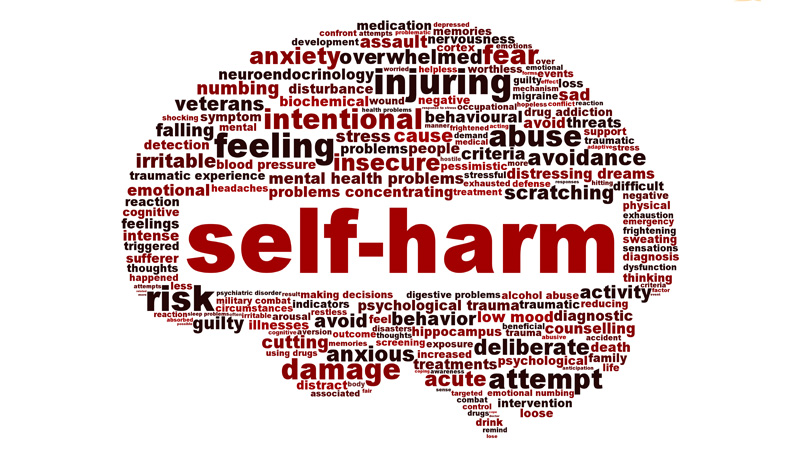SELF-HARM: SIGNS AND TREATMENT
Self-harm is when an adolescent intentionally hurts his or her body in a compulsive manner. This can include cutting, burning, or other physically harmful behaviors.

General Information
There is a common misconception that all young people who inflict self-harm do so because they have suicidal ideation, when in reality many teens that self-harm rarely have suicidal intent. Young people use self-harming behaviors as a means to cope with painful experiences, emotions, thoughts, and/ or memories. Due to the fact that one’s natural response to pain and/ or injury is the releasing of endorphins (pleasure releasing chemical in one’s body), a teen can become reliant upon self-harming behaviors to help to mitigate his or her challenging emotions.
At Pacific Teen Treatment our clients are incredibly smart, young individuals who have learned to rely on negative coping skills in attempts to manage their emotions. Our therapeutic staff is highly qualified, and each member has significant experience working with young people. Self-harm is a learned behavior that can be treated. The goal of treating an adolescent that self-harms is to provide them with alternative coping mechanisms, so as to completely refrain from engaging in any further self-harming behaviors.
Signs & Symptoms
Every teenager is different and those that struggle with self-harm may exhibit slightly different signs and symptoms. Some of the possible examples that may indicate that an adolescent is engaging in self-harming behavior can include any combination of the following:
- Cuts or burn marks on legs, arms, abdomen
- Hiding sharp objects (box cutters, knives, razor blades)
- Bizarre excuses for injuries
- Strange scars on one’s body
- Difficulty sleeping
- Agitation
- Wearing long sleeve clothes in hot weather
- Depression
- Changes in communication
- Locking oneself in the bathroom after a challenging day at school
- Avoiding swimming
- Changes in eating habits
Many young people that engage in self-harming behaviors will do so in a location on their body’s that is not visible. Furthermore, teenagers often become attached to their scars and will repeat the behaviors directly over them (i.e. cutting in the same spot). Frequently, to them, their scars are viewed as a physical sign of strength, which is reinforced by inflicting, continued self-harming behaviors in the same location.

Treatment
Pacific Teen Treatment works hard to create an ideal treatment plan for each of our clients. Every treatment plan is uniquely tailored to address the specific needs of each adolescent in treatment. Pacific teen treatment offers a variety of therapeutic modalities.
For young people who struggle with self-harming behaviors, we create a treatment plans that can be made up of a combination of talk therapy, cognitive behavioral therapy (CBT), dialectical behavioral therapy (DBT), expressive arts therapy, and in some cases medication. In situations when medication may be beneficial to one’s recovery process, we work with our on-staff, board certified Child and Adolescent Psychiatrist as well as the teenager’s parents. We include the parents as a means of continued involvement in their child’s treatment process, as well as for permission to administer medications. The reason that medication is sometimes helpful for a young person’s recovery is because often with self-harming behaviors a teen also struggles with anxiety and/ or depression. Helping to further alleviate some of those emotions with medication while simultaneously participating in various therapies can help to lessen their urges to physically harm themselves.
In addition to the many therapeutic modalities, Pacific Teen Treatment emphasizes the importance of everyday healthy routines. We encourage our clients to participate in daily exercise, healthy eating habits, as well as making sure to get the proper amount of sleep. Furthermore, we offer various relaxation methods to our clients, such as yoga and meditation. We feel is important for our teenagers to learn and practice healthy daily schedules as a part of their recovery.
Further Information
Seeking help is never easy, but you are not alone! If you or someone you know is in need of mental health treatment, we strongly encourage you to reach out for help as quickly as possible. It is not uncommon for many mental health difficulties to impact a person’s life, long term. Seeking support at the beginning of one’s journey can put the individual in the best position to learn how to manage themselves in a healthy way so they can go on to live happy and fulfilling lives.
Our admissions team can be reached 24/7 at info@pacificrtc.com or call: Phone Number,(800) 531-5769
We are available to answer any questions you may have regarding mental health treatment and our residential program, anytime. Contact us today using the form to the right.

